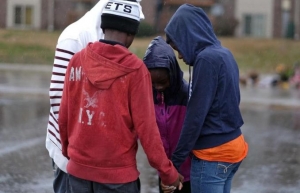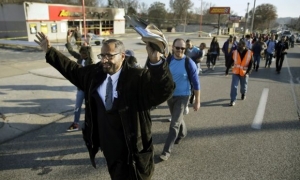
- Home
- About
- Campaigns
- PDA Radio
- Contact Us
- Downloads
- Join Us
- Donate
- Events
- Benefit Kitchen
From Crispus Attucks to Michael Brown: Race and Revolution
March 5 marks an important but oft-overlooked anniversary. On a winter’s day 245 years ago, in the year 1770, an angry crowd formed in Boston, then the capital of the Province of Massachusetts Bay. People were enraged by the extortionate taxes imposed by the British Parliament. In order to quell the public furor, the British sent troops, who violently quashed dissent.
The Women Behind Black Lives Matter
Why #BlackLivesMatter Actions Aren't Stopping
The movement challenging the criminal justice system's treatment of black people continues to build this week. On Monday morning, Bay Area organizers blockaded entrances to Oakland Police Department headquarters and brought traffic to a standstill on nearby Interstate 880.
Activists disrupt traffic in Hammond to protest injustices
A Gary native whose son was fatally shot by police last month in Tennessee was among more than three dozen people who rallied Sunday outside Hammond City Hall to protest racial and social injustice.
America “Is Moving Towards Two Societies, One White, One Black — Separate and Unequal”
Some of you may remember the Kerner Commission, but many younger members of our audience probably will not. The Kerner Report should be required reading for policymakers and anyone trying to understand how we got to where we are now in terms of the black experience in America, the history of the ghetto and government’s responsibility to its citizens.
What will come out of Ferguson?
The grand jury has made its decision. Darren Wilson is no longer a police officer. The protests, in Ferguson, Missouri, at least, are starting to die down.
For African-American children, there’s no ‘Officer Friendly’
Long troubled and tenuous, the relationship between police departments and African-American communities is now toxic, and its repercussions may be most visible in the wounded eyes of black children. Since Brown’s death in August, scores of parents have brought their kids, some barely out of kindergarten, to protests nationwide and sparking discussions with them about racial profiling, police brutality, and the sad, but necessary refrain that “Black Lives Matter.”
Thousands Take Part in National Die-Ins, Demonstrations for Michael Brown
At 1:01 PM on Monday afternoon thousands of individuals—a large portion of whom are college and high school students—stopped what they were doing. In acts of remembrance of slain black teenager Michael Brown, people across the country staged die-ins, demonstrations, and fell quiet for four and a half minutes—a protest which they say is "only the beginning."
Obama announces funding for 50,000 police body cameras
In an announcement today, the White House has pledged $263 million in new federal funding for police training and body cameras, including $75 million allocated specifically for the purchase 50,000 cameras for law enforcement officers across the country.
NAACP chief: Ferguson civil rights march seeks justice for Michael Brown and systemic reform
Hundreds of protesters in Missouri have a begun a week-long long march organised by the National Association for the Advancement of Colored People (NAACP), in a move designed to inspire the spirit of the civil rights movement of 1950s and 60s, following a grand jury’s decision not to indict officer Darren Wilson for the shooting of Michael Brown.









